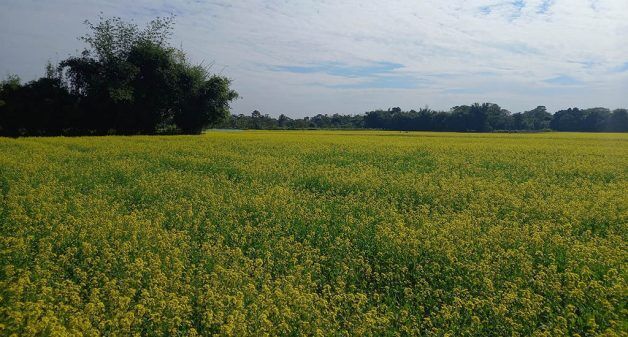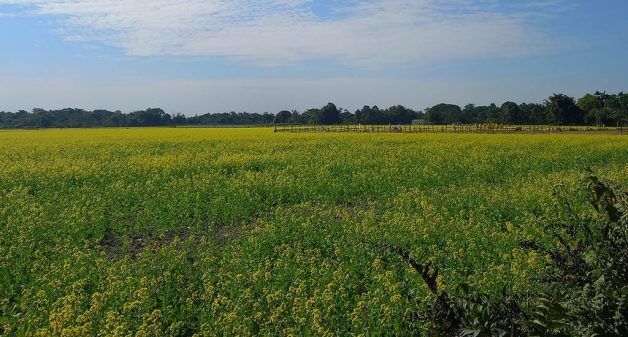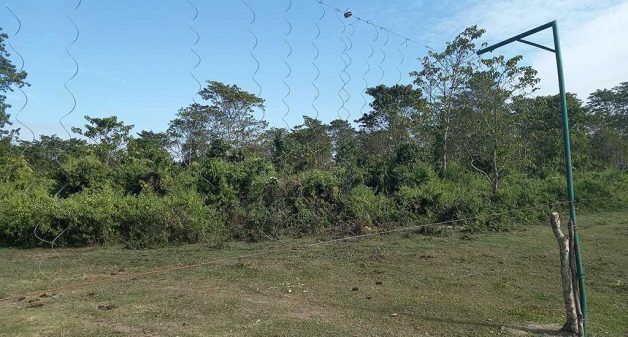
Throw mustard in the elephant’s face
With grains available through the public distribution system, farmers near Manas National Park find no need to grow paddy, and have switched to mustard cultivation to avoid crop raids by elephants.

With grains available through the public distribution system, farmers near Manas National Park find no need to grow paddy, and have switched to mustard cultivation to avoid crop raids by elephants.
The Duchess threw pepper in the baby’s face, spoke roughly and would “beat him when he sneezes because he quite likes pepper but howls only because it teases.” That was Alice in Wonderland’s fictional tale. Here in the remote villages of Chirang district, farmers try to do the same thing, not to babies, thank Ganesha, but to Ganeshas (elephants) themselves!
Rabha people staying close to Meghalaya hills actually grow pepper because it discourages elephants from running amuck in their backyards full of ripe banana and jackfruit. Here in Chirang they grow mustard! (READ: Pepper helps Rabhas to live with tuskers)
But seriously, this is a story of coping mechanisms of small farmers living in close proximity of a national park in Assam.
I visited Barpathar, a village in the Borabazar administrative block of Chirang district in Bodo Tribal Autonomous Districts region of Assam. We met a group of women, who had formed a “producers group” of mustard growers in the village. When I reached the village with my hosts, I was not aware of its location.
As is wont on such occasions, as I sipped the ginger-flavoured “lal cha” (tea decoction), I talked to these producer group members about their life and livelihoods. I asked them about their mustard crop. They said they had already sown it four weeks back. I was quite surprised. To confirm I asked the date on which they had sown.

Rajani Rai (name changed), the lady of the house in whose verandah we were chatting and whose hospitality I was enjoying said that she had sown mustard three days before Diwali – November 1 this year.
Paddy grown in Sali (kharif) here in Assam is typically harvested in December and the field becomes ready for the next crop only by end of December. So, I was a little surprised and asked how she did that so early? Was she able to harvest paddy before that? When did she plant paddy and which variety was this?
They looked at me with surprise and said, “Don’t you know that we don’t grow paddy?” I was surprised, and asked, “What? No paddy in Sali in Assam?”
Then it came out. Right to Food Act and cheap food supply through the ration shops gave much relief to them. The free food for the last 20 months has further eased the burden. So, they can buy the grain they need beyond what they get from the ration shops.
The persistent and recurrent elephant raids from hoards in the Manas National Park, compounded by even more intractable wild boar, had made cultivation very problematic. So they shifted to non-paddy crops.
In kharif they grew ridge gourd as the crop is done in four months flat. The chief determinant of the crop to be grown is picking up something which the elephants would not want to eat. For whatever reasons, the elephant does not eat mustard plants. So, taking mustard is quite ok. Nor do these elephants like turmeric so the farmers can take turmeric as well.

In recent years, electric fence has been erected on the periphery of the national park. The wires are not charged during the day time, but they become live from 6 pm to 6 am. Elephant raids had usually been happening in nights. This electric fencing discourages the elephants as they get electric shocks on touching the live wires.
“But the boar remains very troublesome still. It can enter avoiding the live wires and a boar causes more damage by uprooting the plants than by eating it,” said Rajani Rai.
For quite some time now the whole village has been growing mustard since it protects their income from loss due to elephant raids. Farmers in other villages along the Manas periphery have done the same thing. These villages have become big mustard growers now.
In kharif they all grow vegetables which are harvested by October end. They have thus become more integrated in the market economy.
Whatever its positive or negative fallout, one good thing that has happened here is that the prevalence of brewing local beer has reduced a whole lot. The smell of the brewing would draw elephants like a magnet and their spirited quest would not be deterred by mere electric shocks!
Yapi Kop is a development executive with Seven Sisters development Assistance, Assam.